March 26, 2009
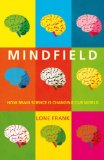
Mindfield: How Brain Science is Changing Our World by Lone Frank (Oneworld Publications, 2009), originally published in Danish in 2007, is now available in English translation.
Product description from the publisher:
Our world is about to be revolutionised. The way we see economics, health, and law enforcement will change. Our perception of happiness, advertising, and even morality will be turned upside down.
Reporting from the frontlines, award-winning writer Lone Frank tracks down the world’s top researchers in brain science and bravely volunteers herself in the name of discovery. As she enrols in a globe-spanning experiment on the moral nature of humanity, endures brain scans to learn the secrets of empathy, and dons a God Helmet to probe the neurological nature of religious experience, her adventures open the door to a plethora of shocking, mind-bending, and frequently comical revelations.
An insider’s guide to the outermost boundaries of brain science, Mindfield offers an uplifting vision of what it means to be human in the new age of the brain.
A sample chapter is available at the publisher’s website.
Comments (2)
- mind,new books,Uncategorized
March 8, 2009
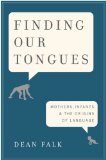
Finding Our Tongues: Mothers, Infants, and the Origins of Language by Dean Falk (Basic Books, 2009).
from the publisher:
Description
Scientists have long theorized that abstract, symbolic thinking evolved to help humans negotiate such classically male activities as hunting, tool making, and warfare, and eventually developed into spoken language. In Finding Our Tongues, Dean Falk overturns this established idea, offering a daring new theory that springs from a simple observation: parents all over the world, in all cultures, talk to infants by using baby talk or “Motherese.” Falk shows how Motherese developed as a way of reassuring babies when mothers had to put them down in order to do work. The melodic vocalizations of early Motherese not only provided the basis of language but also contributed to the growth of music and art. Combining cutting-edge neuroscience with classic anthropology, Falk offers a potent challenge to conventional wisdom about the emergence of human language.
Comments (0)
- culture,language,mind,new books
February 4, 2009
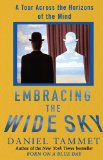
Daniel Tammet provides a window into the mind of an autistic savant in Embracing the Wide Sky: A Tour Across the Horizons of the Mind, while stressing the continuities between savant and non-savant mental abilities.
He suggests that savant abilities might be the result of “cross-talk” or hyperconnectivity between regions of the brain that are ordinarily inhibited from communicating:
Various scientists have speculated on the possibility that a range of neurological conditions, from autism and epilepsy to schizophrenia, might be related to reduced levels of inhibition in the brain, causing abnormal cross-communication between usually separate brain regions. Cognitive scientist Ed Hubbard has argued that such activity within the brain might also account for the multisensory experience of synesthesia. Reduced levels of inhibition in the brain may also play a role in savant abilities: the savant Kim Peek was born without the corpus callosum – the thick band of tissues that connects the left and right hemispheres, and which also serves as the main inhibitory pathway in the brain. …. Specifically I believe that my numerical abilities are linked to activity in the region of my brain responsible for syntactical organization. (p. 138-139)
Tammet goes on to describe the “languageness” of his numerical abilities, for example:
Just as it would be impossible to talk about the word “giraffe” without words like “neck” or “tall,” so it is impossible for me to talk meaningfully about the number 23 without referring to such relations as 529 or 989. (p. 141)
He also relates this hyperconnectivity to creativity in Chapter 6.
Unfortunately the book has no notes and the bibliography is incomplete, so there are no sources given for many of the researchers cited in the book. For example there is a quote from Peter Slezak on p. 137-138 with no reference under that name in the bibliography. (I located the source, an “All in the Mind” radio program from 22 Oct 2005.)
Coincidentally, Embracing the Wide Sky was featured in today’s VSL:Science post.
A previous post on this book has some related links.
Comments (0)
- cognitive science,mind
December 30, 2008
Impro: Improvisation and the Theatre by Keith Johnstone (Routledge, 1987)

Though I’d much rather sit in the back row than stand up in front of people doing anything, I was hooked into Impro by Keith Johnstone after reading the first page, which starts out:
As I grew up, everything started getting grey and dull. I could still remember the amazing intensity of the world I’d lived in as a child, but I thought the dulling of perception was an inevitable consequence of age—just as the lens of the eye is bound gradually to dim. I didn’t understand that clarity is in the mind.
I’ve since found tricks that can make the world blaze up again in about fifteen seconds, and the effects last for hours.
[…which he then goes on to tell about!]
A little later, though still on the first page, Johnstone talks about “attending” to images: “I learned to ‘hold the mind still’ like a hunter waiting in a forest” and (now on page two) “After a lot of practice at attending to the images I conjured up, I belatedly thought of attending to the reality around me. Then the deadness and greyness immediately sloughed off…”
Comments (0)
- mind
December 27, 2008
Steven Rose reviews four books in today’s Guardian (27 Dec 2008):
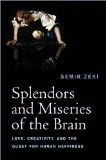
- Splendours and Miseries of the Brain: Love, Creativity and the Quest for Human Happiness by Semir Zeki (coming soon in the US, available in the UK) [Amazon has “Search Inside”, so an excerpt is available]
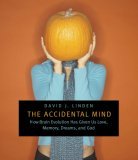
- The Accidental Mind: How Brain Evolution Has Given Us Love, Memory, Dreams, and God by David J Linden,

- The Evolution of Morality by Richard Joyce,
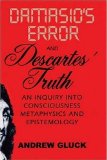
and
- Damasio’s Error and Descartes’ Truth: An Inquiry into Consciousness, Metaphysics, and Epistemology by Andrew Gluck.
Rose (author of The 21st Century Brain: Explaining, Mending and Manipulating the Mind) reminds us that “it is not brains that have concepts or acquire knowledge. It is people, using their brains” and concludes:
If humans do have an evolved sense of morality, or indeed of beauty or romantic love, the evidence shows that in practice our standards are remarkably flexible. Under these circumstances, to seek for their neurobiological correlates may be on a par with hunting the crock of gold at the end of the rainbow. With the difference that the gold could at least be put to practical use.
Comments (0)
- cognitive science,mind










